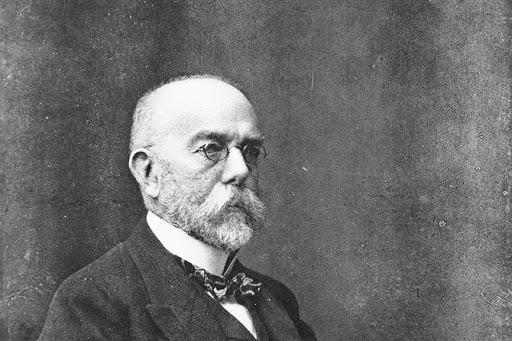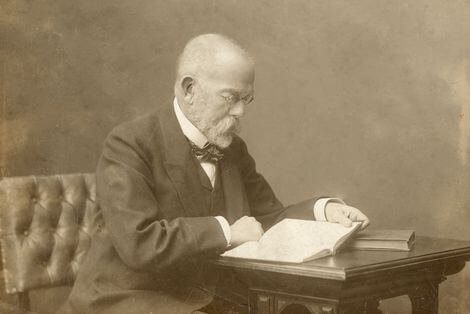In the mid-nineteenth century, life expectancy had its limit long before reaching old age, and not a few diseases that today we did not even suffer to prevent with a vaccine were synonymous with death.
The German scientist Robert Koch contributed so decisively to the study of diseases that he is considered the father of modern medical microbiology and bacteriology with the famous Louis Pasteur despite the few resources with which he achieved it.
With such crucial discoveries as the identification of the germ that causes tuberculosis, not only did he get the Nobel Prize in Physiology and Medicine, but his postulates, when he managed to establish the necessary requirements to prove that a certain microbe is the cause of an infectious disease, are still nowadays a fundamental piece in the current investigations.

In a time when the patterns of science went from being a hobby of laboratory to a profession, Koch always had very clear his dedication to infectious diseases and therefore established that bacteria are necessary for our body, but some of them they cause diseases that can be deadly.
Robert Heinrich Hermann Koch was born in Clausthal (at that time Kingdom of Hanover) on December 11, 1843. He was the third child of a total of eleven and showed precocity to learn to read thanks to the daily management of newspapers. Like his father, a mining technician, he also always had a desire and a fondness to travel, which undoubtedly should have helped him later to know places in remote Africa and India to study diseases and epidemics such as malaria and the plague. .
As a child, Robert Koch felt passion for nature, especially for animals, so when he finished school, always with good grades for his dedication and taste for study, he enrolled in the University of Göttingen to pursue a medical career and there he was interested in Microbiology. Always as a model student, he learned that infectious diseases can be caused by living organisms, bacteria, and from that moment he became an inseparable friend of the microscope.
After obtaining his degree, he moved to Berlin to study Chemistry, and later completed his training with an internship at the General Hospital of Hamburg. However, when the young Robert Koch began to practice private medicine he realized that his knowledge was insufficient and impotent against the epidemic diseases that left so many lives on the way, so he decided to start studying the germs responsible for these diseases.
His first studies focused on the anthrax bacillus, since he witnessed an epidemic that devastated hundreds of cattle. In his small laboratory, Robert Koch conducted several experiments to demonstrate that the anthrax bacillus caused the disease that infected cattle and that these bacteria were able to reproduce even without direct contact with the animal.
He invented methods to extract the bacillus from the blood samples and make it grow in pure cultures. He also discovered that while he was unable to survive for long periods outside the living being, the bacillus could create endospores that could. These endospores, embedded in the ground, were the cause of the unexplained spontaneous outbreaks of anthrax. Koch published his discoveries in 1876 and was awarded a job at the Imperial Health Office in Berlin in 1880. A year later, in 1881, he promoted the sterilization of surgical instruments by heat.
In the scientific environments of the time, the discovery of Koch was really a revelation and meant a revolution as of that moment, since the German doctor did not dispose, much less, of a laboratory equipped for this type of experiments. Thanks to his intuitions, other scholars and later researchers were able to follow his steps and deepen their studies.
In 1885 he was appointed professor of Hygiene at the University of Berlin and in 1891 he became an honorary professor of the Faculty of Medicine and director of the Prussian Institute of Infectious Diseases (renamed the Robert Koch Institute in his honor), although he resigned his position in 1904 .

Tuberculosis
Robert Koch is best remembered for the discovery of the bacteria responsible for tuberculosis (also called Koch’s Bacillus), as well as identifying the substance that acts as a remedy for the disease, the so-called tuberculin.
Another influential biologist of his time, Rudolf Virchow, opposed Koch’s research in stating that diseases are due almost exclusively to the malfunction of the patient’s own cells. This scientific rivalry mixed with misgivings and jealousies about the professional and academic conditions and the preparation of each one. Another conclusion of Koch, fully tested today, was that human and bovine tuberculosis are produced by different germs, which also sparked multiple criticisms and great opposition when in 1901 he reported it to the International Medical Congress on Tuberculosis in London.
Three years later he dedicated himself to the study of vibrio cholera, another disease that at that time was also very contagious and with a high lethal percentage. The findings of the German researcher in the field of epidemiology paved the way for official and worldwide recognition, which took place in 1905 with the awarding of the Nobel Prize in Medicine and Physiology.
Koch also made some trips to Egypt, South Africa, Rhodesia and India to carry out experiments on some diseases that affected livestock and also worked a lot on malaria, a relatively new disease in those years and to which he managed to provide a lot of information.
Nobel Prize
As important as his work in tuberculosis, for which he was awarded the Nobel Prize, are the Postulates of Koch, which state that to establish that an organism is the cause of a disease, it must be present in all cases in which the disease is examined and absent in healthy organisms; it must be able to be prepared and maintained in a pure culture; have the ability to produce the original infection after several generations in a crop and, finally, must be able to be inoculated in animals and cultivated again.
Thanks to Koch’s research, and especially to his methods, both his students and his pupils discovered the organisms responsible for diphtheria, typhus, pneumonia, gonorrhea, cerebrospinal meningitis, leprosy, pulmonary plague, tetanus and syphilis, among others.
In early 1910, Robert Koch fell ill and died in Baden-Baden on May 27, 1910 of a heart attack when he was 66 years old.
The legacy of Robert Koch remains valid both in research methods and in the guidelines for determining diseases thanks to the professionalization with which he equipped a still incipient science in the mid-nineteenth century.